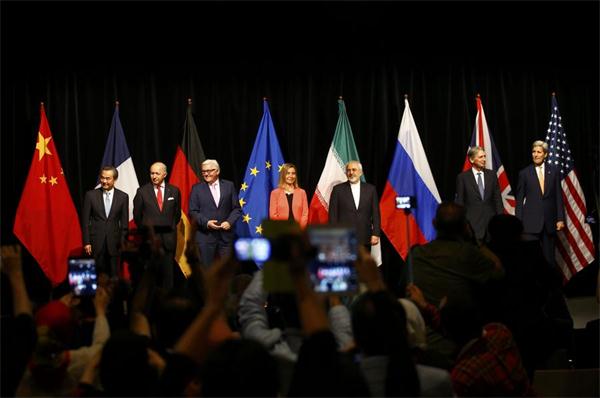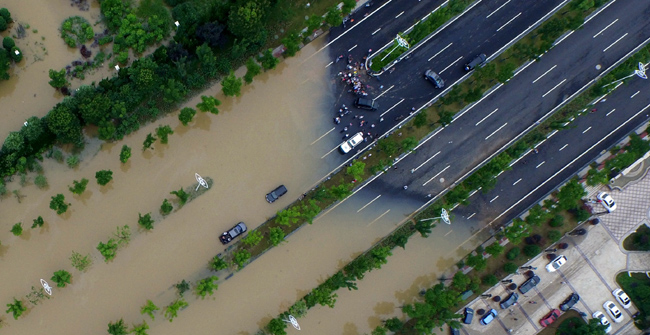Iran nuclear deal opens new vistas of opportunities
Updated: 2015-07-17 08:39
By Chen Weihua(China Daily)
|
|||||||||||
 |
|
Chinese Foreign Minister Wang Yi, French Foreign Minister Laurent Fabius, German Foreign Minister Frank Walter Steinmeier, High Representative of the European Union for Foreign Affairs and Security Policy Federica Mogherini, Iranian Foreign Minister Mohammad Javad Zarif, British Foreign Secretary Philip Hammond and U.S. Secretary of State John Kerry (L-R) pose for a family picture after the last plenary session at the United Nations building in Vienna, Austria July 14, 2015. [Photo/Agencies] |
The long-term and comprehensive nuclear agreement reached on July 14 between Iran and P5+1 - China, the US, Russia, France, the UK plus Germany - should be applauded for opening a new channel of peace for not only the Middle East, but also the whole world.
The deal ended a 13-year marathon on the Iranian nuclear issue, showing diplomacy and dialogue is the way to tackle thorny regional and global issues.
For the two main players in the issue, Iran and the United States, the agreement has created a stage which they could use to thaw their more than three decades of icy relationship. Yes, the two countries still have many fundamental differences, but that only means they should meet with each other more often to resolve them.
US President Barack Obama and Secretary of State John Kerry demonstrated the courage to move forward on the deal despite strong opposition from many Republicans back home. Those critics, of course, have provided no better alternative, except shouting for more sanctions or even military action. It seems they have forgotten the hard lessons the US has learned in the region over the past decade and more.
The invasion of Iraq in the name of demolishing the non-existent weapons of mass destruction has not only caused the deaths of countless Iraqis and thrown the country into what seems like eternal chaos, it also has cost the lives of thousands of US soldiers and forced American taxpayers to part with trillions of dollars.
This is not the only hard lesson the US should have learned in the Middle East. Look at Libya and Syria, where US military intervention policies have worsened matters, contrary to its declared good intentions, if there was any in the first place.
On the other hand, the imposition of more sanctions on Iran over the past decades has caused more sufferings for the 78 million Iranians, including women and children, by depriving them of better access to food, healthcare and education that they deserved. Sanctions that indiscriminately hurt ordinary people are a crime against humanity.
China and the US had huge differences back in 1971 when their leaders decided to break the ice. While many differences still remain, none would deny that both countries, as well as the rest of the world, have benefited enormously from their relationship.
For the same reason, the US and Iran should embark on a new era of engagement that will benefit not only the two countries and their peoples, but also the whole of volatile Middle East and the world beyond.
While Republican lawmakers in the US try to find ways to denounce the nuclear deal with Iran, American companies are looking at opportunities to invest and do business in Iran after restrictions are lifted.
That is true for China, too, which finds a sanctions-free Iran increasingly important in meeting its energy needs and implementing its ambitious "Belt and Road Initiative". Not for nothing was Iran a key point of the ancient Silk Road.
The Center for American Progress in Washington, the China-United States Exchange Foundation in Hong Kong and the Shanghai Institutes for International Studies issued a joint report on Monday to explore the avenues for China-US cooperation in the Middle East. Despite some starkly different approaches toward the region taken by China and the US, scholars say they should work together more intensely for their many common interests there. The report advises the two countries to avoid picking sides in the conflicts in the region and instead join hands to help the Middle East countries build the blocks of prosperity, enhanced governance and increased linkages to the global economy.
The nuclear deal and a possible improvement in US-Iran relations could greatly increase the prospect of making this vision a reality.
The author is deputy editor of China Daily USA. chenweihua@chinadailyusa.com
Related Stories
Obama challenges critics of Iran deal 2015-07-17 07:53
Iran nuclear deal opens new vistas of opportunities 2015-07-17 07:52
Obama: Iran deal is only alternative to more Mideast war 2015-07-16 09:18
Chinese FM hopes Iranian nuke deal opens up new prospects for China-Iran co-op 2015-07-15 21:36
Today's Top News
ECB raises Greek bank funding as Europe backs new loan
Greek parliament approves debt deal and reforms
British boy with eczema wins support from Chinese Internet users
Internet giants reprimanded over obscene clip
First-tier cities have less appeal to graduates
Chinese cult leader faces criminal prosecution
Former Auschwitz bookkeeper, 94, sentenced to four years in prison
China posts 7% GDP growth rate in Q2
Hot Topics
Lunar probe , China growth forecasts, Emission rules get tougher, China seen through 'colored lens', International board,
Editor's Picks

|

|

|

|

|

|






